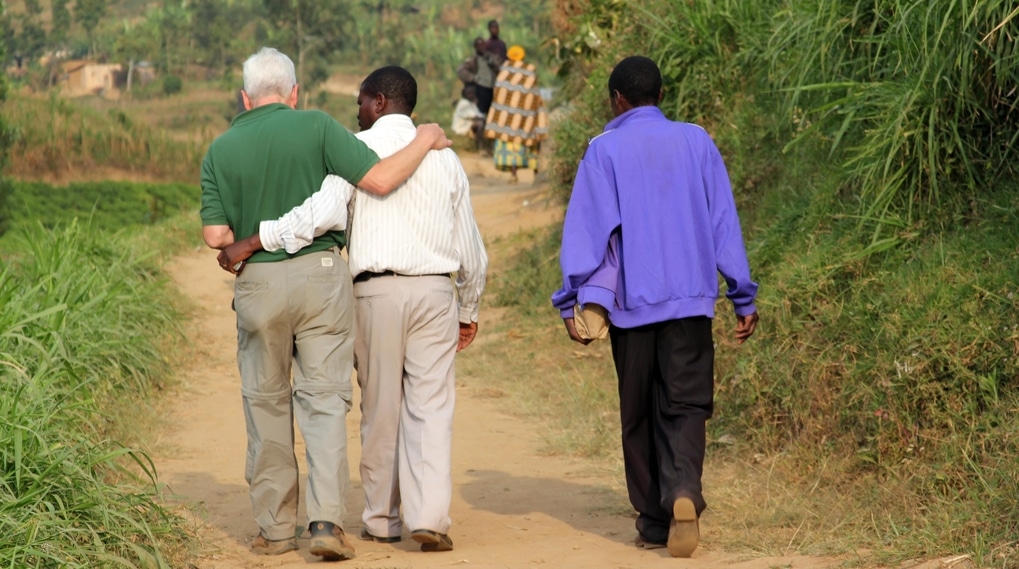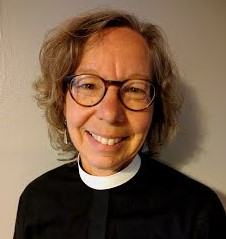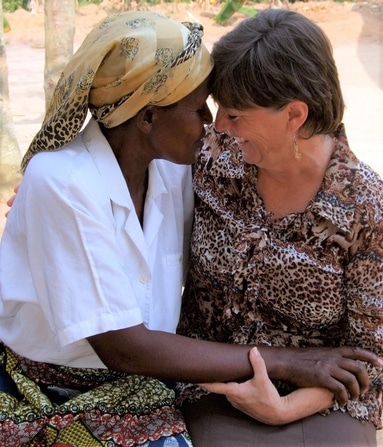
Talking with Regina Hopewell about Rwanda is like standing at the beach, taking in wave upon wave of an endless ocean. The ideas and possibilities pour continually, but each one comes with steadiness and passion, ready and waiting for those willing to take hold of the opportunities and rewards of partnering with our brothers and sisters on the other side of the globe.
“We would love to see people, churches, engaged in relationship with Christians who are not of their culture, who are not of their nationality, their economic status,” says Hopewell, “that are truly part of the body of Christ, but are in many, many ways living a different life.”

Deacon Regina Hopewell
Hopewell is the Director of Rwanda Ministry Partners, an Anglican organization just formed in 2016, working to preserve the relationships that blossomed through PEARUSA and create new connections between American and Rwandan churches. After spending 16 years with Compassion International in Colorado Springs, Hopewell stepped down from her work there to pursue a deaconate ordination, coordinating her church’s Rwandan sister church relationship as her ministry. In 2015, she served on the design team to help PEARUSA churches explore how to maintain sister church relationships after transitioning to ACNA leadership. With the blessing of Archbishop Foley and Archbishop Rwaje, Rwanda Ministry Partners was born.
“It’s a different kind of ministry… I’m sort of the matchmaker between a church here that wants a sister church there,” says Hopewell. “I do the introductions, I do some of the training, I share best practices with churches, I help to step in and facilitate when they have questions.”
Many ACNA churches are already deep into a Rwandan sister church relationship because of PEARUSA, but Rwanda Ministry Partners now offers a chance for the entire province to benefit. Hopewell stays connected with the Rwandan House of Bishops so that the connecting of two churches is a true partnership, with Rwandan clergy deciding on the most appropriate diocese and parish to pair with an American congregation. Sister church relationships often simply revolve around prayer and friendship.
“It’s knowing that the body of Christ is out here supporting and caring about them and interested in the work that they’re doing, and the challenges that they have in their communities,” says Hopewell. “God is working. God is already there, just like God is already here.”
 Projects and pilgrimage trips also often result as well. While many churches plan their own trips, Hopewell also now leads two trips a year to Rwanda – the next one coming up this July – escorting Americans from several churches around to their respective sister parishes. American clergy and parishioners enjoy the chance to see how other sister churches operate, and come back with lessons and a perspective not easily gained in America.
Projects and pilgrimage trips also often result as well. While many churches plan their own trips, Hopewell also now leads two trips a year to Rwanda – the next one coming up this July – escorting Americans from several churches around to their respective sister parishes. American clergy and parishioners enjoy the chance to see how other sister churches operate, and come back with lessons and a perspective not easily gained in America.
“How do brothers and sisters live with the constant struggle of not having enough money to send your children to school? Or to have a consistent idea of where our food will come from if our harvest fails? How do brothers and sisters live and make it with that kind of struggle day in and day out?” Hopewell says.
She also adds that Americans are enriched by the reconciliation and forgiveness that is ongoing in Rwanda after the 1994 genocide, where Christians may live next door to someone who hurt or killed their family members.
“Can we live next to our neighbor who perhaps we fear might do harm to us? Can we actually love them as Christ loves us and learn how to apply some of these hard lessons to our own lives?”
Hopewell has been drawn to Rwanda through her work at Compassion and through her church’s sister relationship, since her church in Colorado Springs was a Rwandan church plant.
“I just loved the idea that the developing world was basically exhibiting more of the qualities of what a church should be than the church in America,” says Hopewell. “I think so often the American church feels like, ‘We have it all together, and we have to go teach the poor people in the developing world what it’s like to be real Christians.’ And I just love it that it was upside down, that it was the other way around.”
Sister church relationships with Rwanda have resulted in all kinds of aid projects as well: the building of schools, scholarships for secondary school and university students, clinics, and infrastructure. But any projects are done after a period of relationship, and involve a posture of listening, prayer, and dialog.
“It has to evolve, and it has to be something that the bishops agree to and that God has really put on people’s hearts to be appropriate,” says Hopewell. “We’re not trying to go in and fix things, we’re trying to show Rwandans that they’re our brothers and sisters, and we pray for them, and we think about them, and we’re in this for a long-term relationship.”
Hopewell has spent the last year getting the word out about Rwanda Ministry Partners, and she’s still hearing bits and pieces about different parishes that have Rwandan sister churches. She’s bursting, it seems, with ideas for any parish to get connected: She mentions offering Rwandan coffee and Rwanda collection baskets, and is excited about a new pilot program wherein churches or individuals can sponsor Rwandan children through Compassion.
“People can get involved in these projects without having a sister church relationship… There’s a church in Virginia that is building a school on Nkombo Island. They would love it if somebody from a church in Mississippi or wherever sends them a $200 donation to their project,” says Hopewell. “We know that a sister church relationship is a huge commitment for people. Don’t feel like your church isn’t big enough, or couldn’t handle this… there are lots of flexible ways to do this.”
Hopewell sums up the Rwandan-American relationship in a statement that either side could hold to: “We’re coming with our hands open, but we’re also coming knowing that we have a lot to bring to you, and let’s figure out together how we walk forward in this journey God has placed us on together, supporting one another and loving one another.”
Please contact Rwanda Ministry Partners:
- If your parish has an existing connection with Rwanda in any capacity, so Hopewell can network new contacts with existing opportunities.
- If your parish would like to explore how to become a sister church or partner with an existing sister church.
- If you would like information on how Rwanda Ministry Partners’ resources can translate to your sister church relationship in another country.

by Rachel Moorman, ADOTS Communications Associate
news@adots.org
